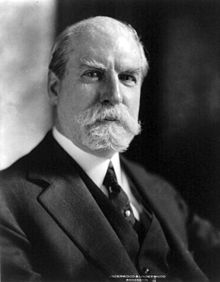
Back تشارلز إيفانز هيوز Arabic تشارلز ايفانز هيوز ARZ چارلز ایوانز هیوز AZB Чарлз Эванс Х’юз Byelorussian Charles Evans Hughes Czech Charles Evans Hughes Welsh Charles Evans Hughes Danish Charles Evans Hughes German Charles Evans Hughes Esperanto Charles Evans Hughes Spanish
Charles Evans Hughes | |
|---|---|
 Hughes in 1931 | |
| 11th Chief Justice of the United States | |
| In office February 24, 1930 – June 30, 1941[1] | |
| Nominated by | Herbert Hoover |
| Preceded by | William Howard Taft |
| Succeeded by | Harlan F. Stone |
| Judge of the Permanent Court of International Justice | |
| In office September 8, 1928 – February 15, 1930 | |
| Preceded by | John Bassett Moore |
| Succeeded by | Frank B. Kellogg |
| 44th United States Secretary of State | |
| In office March 5, 1921 – March 4, 1925 | |
| President | |
| Preceded by | Bainbridge Colby |
| Succeeded by | Frank B. Kellogg |
| Associate Justice of the Supreme Court of the United States | |
| In office October 10, 1910 – June 10, 1916[1] | |
| Nominated by | William Howard Taft |
| Preceded by | David Josiah Brewer |
| Succeeded by | John Hessin Clarke |
| 36th Governor of New York | |
| In office January 1, 1907 – October 6, 1910 | |
| Lieutenant |
|
| Preceded by | Frank W. Higgins |
| Succeeded by | Horace White |
| Personal details | |
| Born | April 11, 1862 Glens Falls, New York, U.S. |
| Died | August 27, 1948 (aged 86) Osterville, Massachusetts, U.S. |
| Resting place | Woodlawn Cemetery |
| Political party | Republican |
| Spouse |
Antoinette Carter
(m. 1888; died 1945) |
| Children | 4, including Charles and Elizabeth |
| Education | |
| Signature |  |
Charles Evans Hughes Sr. (April 11, 1862 – August 27, 1948) was an American statesman, politician, academic, and jurist who served as the 11th chief justice of the United States from 1930 to 1941. A member of the Republican Party, he previously was the 36th governor of New York (1907–1910), an associate justice of the Supreme Court (1910–1916), and 44th U.S. secretary of state (1921–1925). As the Republican nominee in the 1916 presidential election, he lost narrowly to Woodrow Wilson.
Born to a Welsh immigrant preacher and his wife in Glens Falls, New York, Hughes graduated from Brown University and Columbia Law School and practiced law in New York City. After working in private practice for several years, in 1905 he led successful state investigations into public utilities and the life insurance industry. He won election as the governor of New York in 1906, and implemented several progressive reforms. In 1910, President William Howard Taft appointed Hughes as an Associate Justice of the Supreme Court of the United States. During his tenure on the Supreme Court, Hughes often joined Associate Justice Oliver Wendell Holmes Jr. in voting to uphold state and federal regulations.
Hughes served as an associate justice until 1916, when he resigned from the bench to accept the Republican presidential nomination. Though Hughes was widely viewed as the favorite in the race against incumbent Democratic President Woodrow Wilson, Wilson won a narrow victory. After Warren G. Harding won the 1920 presidential election, Hughes accepted Harding's invitation to serve as secretary of state. Serving under Harding and Calvin Coolidge, he negotiated the Washington Naval Treaty, which was designed to prevent a naval arms race among the United States, the United Kingdom and Japan. Hughes left office in 1925 and returned to private practice, becoming one of the most prominent attorneys in the country.
In 1930, President Herbert Hoover appointed him to succeed Chief Justice Taft. Along with Associate Justice Owen Roberts, Hughes emerged as a key swing vote on the bench, positioned between the liberal Three Musketeers and the conservative Four Horsemen. The Hughes Court struck down several New Deal programs in the early and the mid-1930s, but 1937 marked a turning point for the Supreme Court and the New Deal as Hughes and Roberts joined with the Three Musketeers to uphold the Wagner Act and a state minimum wage law. That same year saw the defeat of the Judicial Procedures Reform Bill of 1937, which would have expanded the size of the Supreme Court. Hughes served until 1941, when he retired and was succeeded by Associate Justice Harlan F. Stone.
- ^ a b "Justices 1789 to Present". www.supremecourt.gov. Washington, D.C.: Supreme Court of the United States. Archived from the original on April 15, 2010. Retrieved January 19, 2019.
© MMXXIII Rich X Search. We shall prevail. All rights reserved. Rich X Search